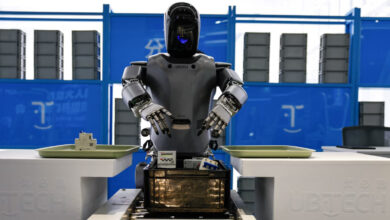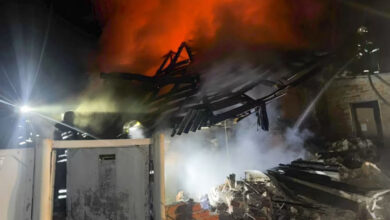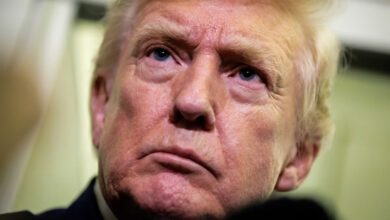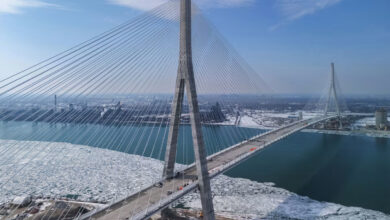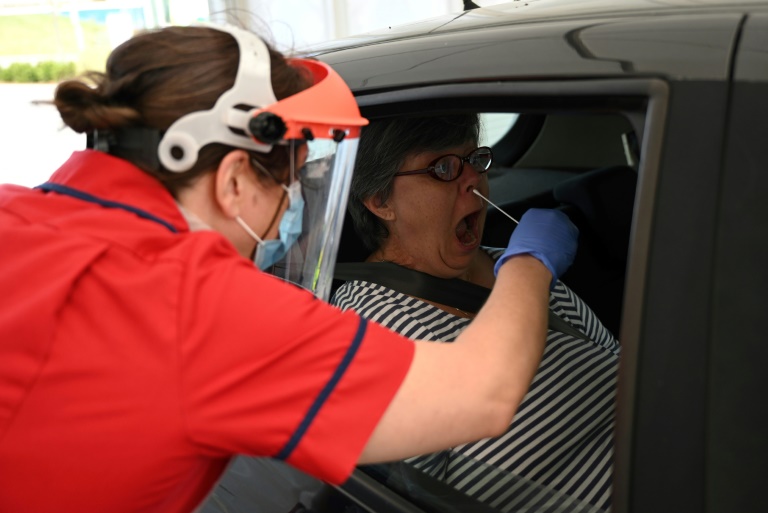
President Donald Trump made his first major foray out of the White House since the coronavirus lockdown began in a push for economic reopening as the daily US death toll from the disease spiked.
It came as Britain became the country with the second most deaths in the world at 32,000, putting it above Italy in the grim ranking of national fatalities.
Elsewhere in Europe, hard-hit Spain and France reported a levelling off of figures, offering hope that life could slowly start returning to normal, but in Latin America the death toll passed 15,000.
With experts warning of a severe global recession, many governments have been easing stay-at-home measures to try to revive reeling economies.
“We can’t keep our country closed for the next five years,” Trump said on a trip to a mask-making factory in Arizona, conceding that some people would be “badly affected.”
And in the latest sign his administration no longer considers the pandemic its top daily priority, the White House is set to disband the emergency task force handling the outbreak.
“I think we’re starting to look at the Memorial Day (May 25) window, early June window” for shutting it down, Vice President Mike Pence said.
Trump urged US states to ease restrictions as he attempts to fire up the world’s biggest economy before the November presidential election, when the high death toll and millions of lost jobs could cost him dearly.
At least 256,422 people have died of the novel coronavirus since the epidemic surfaced in China late last year, according to an AFP tally.
The United States is the worst-hit country, with more than 70,000 deaths, ahead of Britain where fatalities topped 32,000.
The new UK toll from the Office for National Statistics and regional health bodies has not yet been incorporated into the government’s deaths figure of 29,427.
The US registered 2,333 more deaths over the 24 hours to Tuesday evening, according to a Johns Hopkins University tracker, more than twice as many as the day before.
Some scientific models suggest the figure will rise to 3,000 a day by June
In New York, the challenge was further highlighted when 15 children were hospitalized with a rare inflammatory disease possibly linked to the coronavirus, raising alarm in the medical community.
The children were diagnosed with Kawasaki disease, a mysterious illness that causes the walls of arteries to become inflamed, resulting in fever, skin peeling and joint pain.
Four of the patients tested positive for COVID-19 and six were found to have antibodies, suggesting they had previously been infected.
Countries across the world are balancing the need to revive stalled economies against the risk of a new wave of deadly infections.
In Germany, regional leaders pushed back against Chancellor Angela Merkel’s pleas for caution, with the biggest state Bavaria saying it would reopen restaurants and hotels this month.
Hong Kong announced plans to reopen schools, cinemas, bars and beauty parlours from Friday, while Californian bookshops, florists and clothing stores will also be allowed to reopen at the end of the week.
Social distancing rules were eased in South Korea, where workers went back to offices on Wednesday, and museums and libraries were reopened.
And in ground-zero Wuhan, Chinese youngsters filed back to class on Wednesday for the first time since the city was shut down in January, wearing masks and walking past thermal scanners.
– ‘I’m used to working’ –
The pandemic’s economic casualties have continued to pile up.
“It’s better now that I’m waking up and doing something,” South African mechanic Milton Nkosi, 40, told AFP as he checked a new set of tyres at a garage in Johannesburg.
“I’m used to working,” he added. “It’s the first time in my life to stay home so many days.”
But the garage called back just four of its eight employees after being closed for five weeks and is only partially open — underlining the huge challenge to rebuild the global economy.
Spain added 280,000 people to its jobless ranks, while the Virgin Atlantic airline said it would have to fire one in three staff as the virus grounds planes worldwide.
Walt Disney said it expected an impact of some $1.4 billion in the current fiscal quarter as a result of a massive hit to its theme parks and other operations.
And home-sharing platform Airbnb announced it would slash one fourth of its workforce due to the collapse of the travel industry.
– Baseball, without fans –
In a ray of hope for the sports world, South Korea’s baseball players returned to action, albeit to empty stadiums.
Banners with photos of masked fans stretched across the bleachers at the SK Wyverns club’s Munhak Baseball Stadium in Incheon.
Players have been asked not to shake hands or exchange high-fives, while spitting is prohibited.
Friday will also see the delayed start of the country’s football K-League.
In Europe, Juventus players returned to individual training at the Italian football giants’ base in Turin on Tuesday, though their Portuguese star Cristiano Ronaldo began two weeks’ quarantine on his return following two months of confinement on his native island of Madeira.
But in Britain, sports leaders warned of the “catastrophic” impact of the virus, with football, cricket and rugby counting the cost of delayed or cancelled tournaments and leagues.
burs-bgs/bfm/axn/qan/amj
Image: POOL/AFP / Neil HALL Clinical staff test a key worker for the novel coronavirus at the Royal Papworth Hospital in Britain, which has suffered a rising coronavirus death toll

